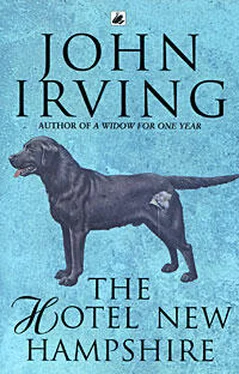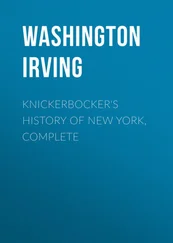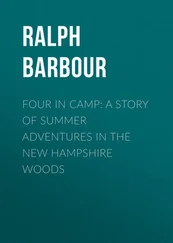“No wonder they can’t drive,” I said—which is a typical Maine point of view toward out-of-staters.
“Yeah, well,” Susie said. “You’d probably look like an idiot in an Arizona desert.”
“What’s a desert?” Father asked, and Susie laughed.
The driver of the Arizona bus was walking through the snow toward us; he didn’t even know how to walk in the snow—he kept falling down.
“They’ve had a rape all the way out in Arizona, Susie,” I told her. “And you’re so famous, they’ll only talk to you .”
“Don’t they know we’re a resort hotel?” Father asked, peevishly. “I’ll tell whoever it is that we’re closed for the season.”
The man from Arizona was sorry to hear that. He explained that he thought he was headed for the mountains, for some skiing—which he and his family had never tried before—but that he’d been given some bad directions or he got lost in the storm, and here he was at the ocean, instead.
“Wrong season for the ocean,” Father pointed out. The man could see that. He looked nice, but awfully tired.
“We do have enough room,” Susie whispered to me.
I didn’t want to start taking in guests; in fact, what I loved best about this Hotel New Hampshire was that the only guests were in Father’s mind. But when I saw all the little kids pile out of the Volkswagen bus and start playing in the snow, I had a change of heart. The mother looked awfully tired, too—nice but tired.
“What’s that ?” one of the kids was screaming.
“It’s an ocean, I think,” the mother said.
“An ocean !” the children shouted.
“Is there a beach, too?” one of the kids cried.
“Under all that snow, I guess,” the mother told them.
So we invited the man and his wife and his four little children to be our guests in the Hotel New Hampshire, even though we were “closed for the season.” It’s easy to make more pasta; it’s easy to stretch a mussel sauce.
Father got a little confused, showing our guests to their rooms. It was the first time he’d had to show a guest to a room in this Hotel New Hampshire, and it occurred to him, as he was hunting for linen in the library, that he didn’t know where anything was. I had to help him, naturally, and I did a fair job of pretending that I showed guests to their rooms all the time.
“You’ll have to forgive “us if we seem a little unprofessional,” I told the father of the nice young family. “When we’re closed for the season, we get a little out of practice.”
“It’s sweet of you to take us in,” the nice young mother said. “The kids were disappointed not to see the skiing, but they’ve never seen an ocean, either, so it’s a treat for them. And they can get to the skiing tomorrow,” she added. She sounded like a good mother to me.
“I’m expecting a child myself,” I told her. “Any day now.” And only later did Susie point out to me that my remark must have seemed odd, since even Susie was clearly not pregnant.
“What the hell must they have thought you meant , you moron!” Susie said.
But everything was fine. The kids had wonderful appetites, and after dinner I showed them how to make an apple pie. And while the pie was baking, I took them for a scary, wintry walk down to the snow-blown beach and the drifted-over docks; I showed them the violent waves bashing through the laces of ice that fringed the shore, I showed them that the sea in a storm is a great gray swell of water rolling, forever rolling. My father, of course, told the young husband and wife from Arizona all about the fabulous space for sympathy that a truly great hotel provides; he described our hotel to the nice people from Arizona, Susie told me, as if he were describing the Sacher.
“But it’s as if we are the Sacher, to him,” my warm bear said in my arms that night, while the storm howled and the snow fell.
“Yes, my love,” I told her.
It was wonderful to lie in bed in the morning and hear the voices of the children; they had discovered the barbells in the ballroom, and Father was giving them pointers. Iowa Bob would have loved this Hotel New Hampshire, I thought.
That was when I woke up Susie and asked her to get into the bear suit.
“ Earl !” she complained. “I’m too old to be a bear anymore.” She is a bit of a bear in the early morning—my dear Susie.
“Come on, Susie,” I said. “Do it for the kids. Think of what it will mean to them.”
“What?” Susie said. “You want me to scare children?”
“No, no, Susie,” I said. “Not scare them.” All I wanted her to do was dress up in the bear suit and walk outside, in the snow, around the hotel, and I would suddenly call out, “Look! Bear tracks in the snow! And they’re fresh !”
And the people, big and small, from Arizona would all come out and wonder over the wilderness they had stumbled upon, as if in a dream, and then I would cry, “Look! There’s the bear! Going around the woodpile!” And Susie would pause there—perhaps I could persuade her to give us a good Earl ! or two—and she would disappear behind the woodpile, in her bear-like fashion, and slip in one of the back doors, and slip out of her disguise, and come into the kitchen, saying, “What’s all this about a bear? You rarely see a bear around here anymore.”
“You want me to go outside in the fucking snow?” Susie asked.
“For the kids, Susie,” I said. “What a treat it would be for them. First they see the ocean and then they see a bear . Everyone should see a bear, Susie,” I said. Of course she agreed. She was grouchy about it, but that made her performance all the better; Susie was always superb as a bear, and now she is getting convinced that she’s a lovely human being, too.
And so we gave the strangers from Arizona a vision of a bear to take away with them. Father waved good-bye to them from the ballroom, after which he said to me, “A bear, huh? Susie will catch her death, or at least pneumonia. And no one should be sick—no one should even have a cold—when the baby comes. I know more about babies than you do, you know. A bear ,” he repeated, shaking his head, but I knew that the people from Arizona had been convinced; Susie the bear is a masterpiece of conviction.
The bear that paused by the woodpile, its breath a fog upon the bright, cold morning, its paws softly denting the fresh, untouched snow—as if it were the first bear on, earth, and this the planet’s first snow— all of it had been convincing. As Lilly knew, everything is a fairy tale.
So we dream on. Thus we invent our lives. We give ourselves a sainted mother, we make our father a hero; and someone’s older brother, and someone’s older sister—they become our heroes, too. We invent what we love, and what we fear. There is always a brave, lost brother—and a little lost sister, too. We dream on and on: the best hotel, the perfect family, the resort life. And our dreams escape us almost as vividly as we can imagine them.
In the Hotel New Hampshire, we’re screwed down for life—but what’s a little air in the pipes, or even a lot of shit in the hair, if you have good memories?
I hope this is a proper ending for you, Mother—and for you, Egg. It is an ending conscious of the manner of your favorite ending, Lilly—the one you never grew big enough to write. There may not be enough barbells in this ending to satisfy Iowa Bob, and not enough fatalism for Frank. There may not be enough of the nature of dreams in this ending for either Father or Freud. And not enough resilience for Franny. And I suppose it’s not ugly enough for Susie the bear. It’s probably not big enough for Junior Jones, and I know it’s not nearly violent enough to please some of the friends and foes from our past; it might not merit so much as a moan from Screaming Annie—wherever she lies screaming now.
Читать дальше












